Joint Venture: Real-World Lessons From the Valley’s Experts
ON A FRIDAY MORNING IN SILICON VALLEY, A HIGHLY CAFFEINATED, 20-SOMETHING ENTREPRENEUR IS HUDDLED WITH THE INVESTOR he’s hoping will save his struggling Internet startup. They’re trying to hash out a “down-round”— the kind of deal resorted to when a company’s value has fallen since the previous round of financing. • It sounds like a scene from a Sand Hill Road boardroom, and it could be. But in this case, the entrepreneur is a third-year law student and the investor is a second-year business student. The setting is Professor Joseph A. Grundfest’s Venture Capital class, composed of students pursuing JDs, MBAs, or, in many cases, both. And the negotiation coaches are some of the biggest names in the Valley, including Silver Lake’s Alan Austin ’74, Fenwick & West’s Gordon Davidson ’74 (BS ’70, MS ’71), Sutter Hill Ventures’ Jim Gaither ’64, and C2C Ventures’ Craig Johnson ’74.
As part of the law school’s movement to educate students more broadly with courses and degree programs that complement the traditional legal curriculum, Venture Capital represents an increasingly familiar sight at the law school: a cross-disciplinary course that teaches hands-on skills while simultaneously providing an advanced theoretical perspective on a cutting-edge area of law. [To read about Stanford Law’s joint degree expansion, see “In Brief,” p. 3.]
Toward that end, the law school is offering nearly a dozen crossdisciplinary courses this year. From negotiations classes that involve law, business, and engineering students to simulation courses in which law students work with peers from the natural and social sciences to prepare mock witnesses, there’s growing recognition that today’s students will be entering professions in which no one works alone or solely in one discipline—and in which they must be able to spot and solve problems that cut across multiple fields.
Grundfest ’78, W. A. Franke Professor of Law and Business, puts it in the context of his class: “To be a successful VC lawyer you need significant expertise in corporate law, securities law, intellectual property law, employment law, and compensation law,” he says. “It also helps to understand your client’s technology and to be a great business person, financial analyst, management motivator, and group psychologist.”
This multiplicity of expertise is reflected in the practitioners Grundfest invites as guest speakers. For example, the legendary John Doerr and his colleague John Denniston from Kleiner Perkins Caulfield & Byers lecture on how to identify and valuate portfolio companies. Dan O’Connor and Brooks Stough JD/MBA ’80 (BA ’76) from Gunderson Dettmer address the nuances of down-round financing, and Fenwick & West’s Scott Spector discusses employee compensation issues.
“I make a list of the best VC people in the world and because of our location at Stanford we can actually get them to show up in class at 8 o’clock on a Friday morning,” says Grundfest.
One such luminary is Alan Austin. Standing before the class last January, Austin marched students through the various ways venture capital and private equity funds can be organized. Along the way he identified key issues that investors and their lawyers need to be acutely aware of—for example, how to structure funds so they comply with relevant securities laws but remain as tax-efficient as possible.
“In the real world, the problems that lawyers face don’t have a bow wrapped around them. It’s not just a ‘tax problem’ or a ‘securities problem.’ The class teaches students how to synthesize and deal with multiple dimensions of a problem,” says Austin.
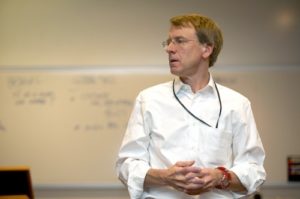
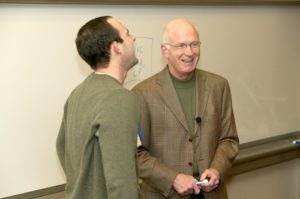
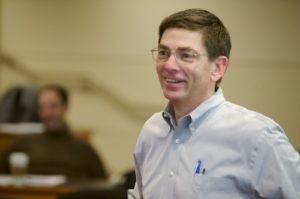
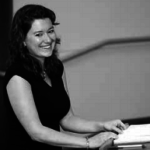
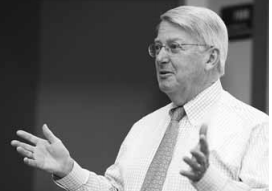
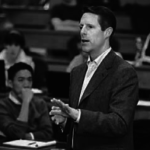
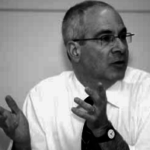
Over the course of the spring semester, Grundfest combines lectures like Austin’s with case studies, research projects, and opportunities to gain transactional skills that include writing a company charter and negotiating a term sheet—the all-important document that outlines the deal between the entrepreneur and the venture capitalist. Grundfest says the latter exercise is indispensable for preparing students, many of whom go on to venture law practices in Silicon Valley, to be business lawyers. “It’s one thing to sit and read articles about the construction of preference provisions,” he notes. “But it’s an entirely different experience to sit down and negotiate preference provisions and figure out how they relate to anti-dilution provisions and to the client’s expectations of where the business will wind up in two to six years.”
A former Navy intelligence officer who now works at Lehman Brothers in Menlo Park, Joe Edelheit Ross ’07 found himself involved in three different startups during his time at law school. He says the legal and financial problems he grappled with during the class came in handy when he went to pitch them to real-life venture capital firms.
Paul Vronsky ’08 found the class similarly useful as a summer associate at Gunderson Dettmer’s San Francisco office, where his work spanned issues ranging from fund formation to employee benefits. “The firm and the class match really well,” he says.
Of course, it also helps to have Grundfest, a former SEC commissioner nationally known in finance and legal circles, as your teacher. “He has a unique ability to turn any complicated matter into something you can understand,” says Ross. “I advise classmates who don’t think they’re interested in capital markets or finance to take a class with Professor Grundfest because when they’re practicing law they’re going to have to understand those things—and he’ll make them interesting.” SL
